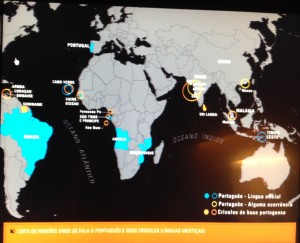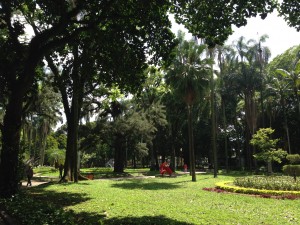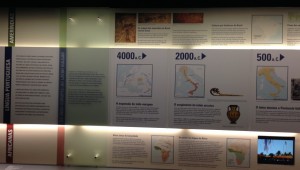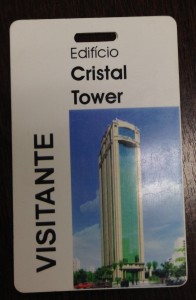
As our cab inched toward Sao Paulo on my first day in Brazil what now seems like many years ago, my friend pointed out the city’s old train station and the neighboring Portuguese language museum. He enthusiastically recommended the museum but advised me to consider waiting to go since everything is written in Portuguese. Thus it wasn’t until almost exactly three months later that I finally found myself back again on a Monday morning, emerging from the complicated underground network of Luz station and arriving in front of what felt like my ultimate test and reward for learning a new language. I snapped pictures of street signs, the Jardim da Luz across the street, the small plaque in front of the museum, everything I could think of to commemorate this most momentous of occasions. As I approached the gate, the security guard informed me that the museum is closed on Mondays.

 With approximately 4,000 things to do and only two days left in the country, it felt like a significant setback. Still, I doggedly headed back the next day, determined to cash in on my Portuguese language-learning efforts. As some consolation, Tuesday is free admission day, and a quick elevator ride later, I was confronted with a large, dark room, with screens wrapping around each wall. These turned out to be audio-visual presentations on Brazilian cultural themes such as football and samba. As a non-native speaker, the music and the interviews seemed disjointed and were difficult to follow so I turned my attention to a large timeline.
With approximately 4,000 things to do and only two days left in the country, it felt like a significant setback. Still, I doggedly headed back the next day, determined to cash in on my Portuguese language-learning efforts. As some consolation, Tuesday is free admission day, and a quick elevator ride later, I was confronted with a large, dark room, with screens wrapping around each wall. These turned out to be audio-visual presentations on Brazilian cultural themes such as football and samba. As a non-native speaker, the music and the interviews seemed disjointed and were difficult to follow so I turned my attention to a large timeline.  Here, starting in 4000 BC, Brazilian Portuguese’s roots are elucidated as three separate timelines of African, European and “Amerindian” languages, which begin to merge at the beginning of the 16th century upon the arrival of Portuguese explorers and the beginning of the slave trade.
Here, starting in 4000 BC, Brazilian Portuguese’s roots are elucidated as three separate timelines of African, European and “Amerindian” languages, which begin to merge at the beginning of the 16th century upon the arrival of Portuguese explorers and the beginning of the slave trade.
The heart of the story begins, as all good ones do, in the 3rd century BC when the Roman Empire finally subjugated the Phoenician city-state of Carthage, in what is now the Iberian Peninsula. Common or “Vulgar” Latin quickly replaced any languages previously spoken in the region, and over the centuries that followed, efforts at linguistic fraternization, first by invading Germanic tribes and later by the Moors, were continuously rebuffed. Thus it was that a brief soaking in unique nasal Celtic vowels here, a sprinkling of Germanic fighting words and Arabic agricultural terms there, that Portuguese emerged, largely unscathed, some 15 centuries later.
Portugal’s history is, of course, an interesting one, particularly in the way it explains the diversion of Portuguese and Spanish—hint: Portugal ain’t got no answer to Spain’s alhambra. But the museum knows it’s not fooling anyone; no one’s here to learn about Portugal. We came for the Brazilian Portuguese! And as the 16th century panel proudly states: “from this point on, it is no longer possible to talk about the Portuguese language without talking about Brazil.”






